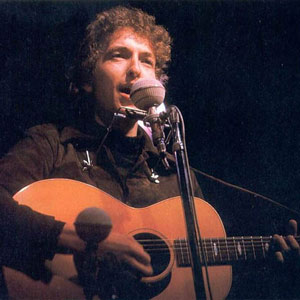|
Bob Dylan
Bob Dylan's site Wikipedia About Continuity, Bob Dylan Bob Dylan stormed in like some kind of prophet to the music scene, blowing a harmonica and strumming an acoustic guitar, singing about freedom and how times were changing. His songs appealed immediately to the youthful idealism of the time - the hope for a society freed of the chains of social repression and injustices. They were heady days; John F. Kennedy was the President, Martin Luther King was galvanising Black Americans against years of racial prejudice, the Cuban missile crisis brought the cold war to a head and America was about to send troops to fight in Vietnam. Whether Dylan did it intentionally or not, he had found an image that suited both his artistic ambitions and the thirst for an authentic voice of the generation. The image however wasn't of his making. He had merely rediscovered something for himself that the rest of the nation had forgotten. This something was the style of dust-bowl poet/singer Woody Guthrie. The workman's clothes, the battered guitar, the nasaly voice, the harmonica, three chord songs; it was all there. Dylan insists to this day that he never considered himself a songwriter. He merely wanted to be like Woody Guthrie and sing gutsy songs about social realities and the actualities of the human condition. Dylan also insists that he didn't invent anything new. The form was already all there - country music, folk music, blues, etc. He merely adapted his own poetic sense to these vernacular forms of musical progression. That may well be but the voice was his; not a smooth voice but a strident one that learned how to sing clearly the words that he wanted to transmit. In 1966, he went on a world tour with a backing band of like-minded musicians that would eventually call itself 'The Band'. He reunited with them after the release of the 'Planet Waves' album out of which comes the hit song 'Forever Young'. He and The Band produced a sound that was later tagged as 'Roots Rock'. In the repertoire there are both joyful and painful songs, mainly about self-recognition and social observations. Dylan's music underlines like shadows the lives of the people of his generation; beatniks, hippies, baby boomers, whatever one likes to call them, following them from the idealism (and naivete) of youth into the problematic areas of the maturing individual conscience. Dylan's image has remained vaguely that of a social revolutionary who wrote protest songs. In truth his real legacy is his reviving of the memory of Woody Guthrie. If Guthrie had lived in modern times, one can see how he would have pursued a career not unlike that of Dylan. The image of the folk singer, the modern troubadour (Mr Tambourine Man) takes his self image, his equipment, his subject matter, more or less directly from Woody Guthrie, thanks largely to the passage through Bob Dylan, of that musical model. In 1974, Bob Dylan released a masterful album called 'Blood on the Tracks'. He summed up the existential blankness of modern life in this song from that album: Simple Twist of Fate | Listen to MP3 D They sat together in the park. F#m As the evening sky grew dark. D D7 She looked at him and he felt a spark, G Tingle to his bones. Gm 'Twas then he felt alone, D A G And wished that he'd gone straight. D G D And watched out for a simple twist of fate. They walked along by the old canal. A little confused I remember well. Stopped into a strange hotel, With the neon burning bright. He felt the heat of the night, Hit him like a frieght, Train moving with a simple twist of fate. A saxophone someplace far off played. As she was walking down by the arcade. As the light burst through a beat up shade, Were he was waking up. She dropped a coin into the cup, Of a blind man at the gate. And forgot about a simple twist of fate. He woke up the room was bare. He didn't see her anywhere. He told himself he did not care, Threw the window open wide. He felt an emptyness inside, To which he just could not relate. Bought on by a simple twist of fate. He hears the ticking of the clocks. And walks along with a parrot that talks. Hunts her down by the waterfront docks, Were the saliors all come in. Maybe she'll pick him out again. How long must he wait? Once again for a simple twist of fate. People tell you its a sin. To know and feel too much within. I still believe she was my twin, But I lost the ring. She was born in spring, But I was born to late. Blame it on a simple twist of fate.
|
||||
